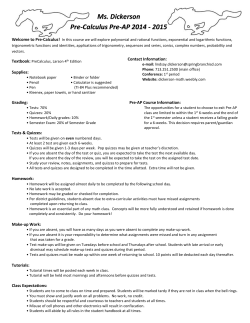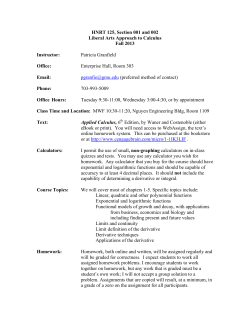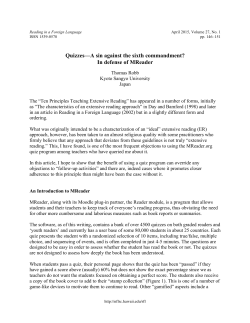
Christopher A. Vaiana Ph.D. Candidate Mahal Lab, Department of
Christopher A. Vaiana Ph.D. Candidate Mahal Lab, Department of Chemistry chris.vaiana@nyu.edu April 12, 2015 To the committee of the Golden Dozen Teaching Award, I have been a graduate student adjunct instructor at NYU for four semesters, mostly for undergraduate majors’ biochemistry, and throughout this time I have come to follow three guidelines of teaching: lead by example, practice harder than you play, and entertain. My overall objectives as an instructor was to motivate the students to learn and love science, and to quantitatively succeed on exams. Learning and motivating is first and foremost, but succeeding by getting good grades is a must. With this philosophy, students can academically succeed with a smile on their face. To lead by example, a teacher needs to become the best student in the class. This means they not only need to work harder than the students – they need to be willing to LEARN more as well. Every new class is an opportunity to learn, especially for a teacher. If you approach teaching a class the same way you approach TAKING a class, you will show your students that the class works. Your own learning will be contagious to your students, and being a “learning role model” will earn you their respect. The saying “practice harder than you play” holds true in sports as well as the classroom. For practical purposes, quizzes can be viewed as practice for exam day. This is my philosophy in designing quizzes and extra assignments for my students. It’s a great feeling when comments from students include both “I really loved this class” and “our quizzes were so hard.” The quizzes I designed combined memorization with application to abstract concepts, and as long as partial credit was plentiful and the answers were explained afterward in detail, everybody ended up on the same page. Finally, entertainment is the most important part of teaching in my opinion. If the audience is not awake and receptive, even the simplest information will be lost. A teacher must read the audience, figure out if they are with you, and adapt if they are not. There is no point speaking to an audience who is not entertained, interested, and alert. Learning also takes time outside of the classroom. Students should be able to come to their teacher outside of class time or normal office hours, with relevant questions. People learn at different paces and in different settings, and as a teacher I am always willing to meet these differences within reason. Independent research is another great way for students to learn outside of the classroom. I often take on undergrads in my research, and they end up learning the science on a different level than simply reading it in a book. Teaching truly is a rewarding job, and the reward correlates with the success of the students. It was my honor to become a part of the education at NYU, an experience that I learned from and will take with me throughout my career. - Christopher A. Vaiana
© Copyright 2025





















